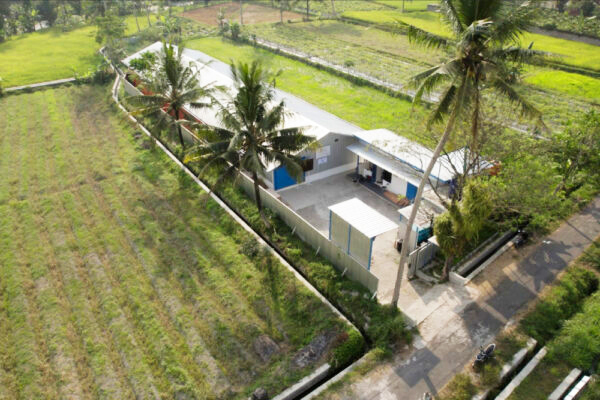 The model farm of the Faculty of Animal Sciences at Gadja Madah University (UGM), in Yogyakarta, Indonesia, was created to operate as a faulty training center emphasizing the importance of animal welfare in the poultry industry.
The model farm of the Faculty of Animal Sciences at Gadja Madah University (UGM), in Yogyakarta, Indonesia, was created to operate as a faulty training center emphasizing the importance of animal welfare in the poultry industry.
As an educational institution, UGM’s journey towards establishing a cage-free egg farm was a collaborative effort. To ensure efficiency, productivity, and a consistent supply of high-quality eggs, UGM employed a strategy for animal welfare and sustainability by adhering to Certified Humane® Farm Animal Care Standards for laying hens.
Cage-free eggs produced by UGM have the Certified Humane® logo and are sold under the brand Fapet Egg. The eggs are distributed mainly to meet the needs of the faculty’s teaching staff, and some product lines are available for purchase at the university’s mini-market and local community resellers.
“We learned about the Certified Humane® program through one of our partners and explored information on the official program website,” says Professor and PhD Budi Guntoro, the university director responsible for Fapet Egg. “This certification is a comprehensive reflection of our dedication to ethical practices throughout our egg production process.”
Although it was feasible to comply with Certified Humane® Farm Animal Standards, Guntoro mentions that a challenge faced by Fapet Egg was the limited availability of birds to adapt to the cage-free system.
According to Guntoro, facing this challenge required strategic collaboration and the development of a supply chain that supported the availability of chickens to adapt to the cage-free system in the region. “Certified Humane® services are a valuable resource that provided us with guidance that not only validates our practices but also contributes to the broader goal of improving the welfare of our chickens.”




International Training Center Cage-Free Innovation and Welfare Hub (Fapet Egg)
Posted: April 2, 2024 by Certified Humane®
As an educational institution, UGM’s journey towards establishing a cage-free egg farm was a collaborative effort. To ensure efficiency, productivity, and a consistent supply of high-quality eggs, UGM employed a strategy for animal welfare and sustainability by adhering to Certified Humane® Farm Animal Care Standards for laying hens.
Cage-free eggs produced by UGM have the Certified Humane® logo and are sold under the brand Fapet Egg. The eggs are distributed mainly to meet the needs of the faculty’s teaching staff, and some product lines are available for purchase at the university’s mini-market and local community resellers.
“We learned about the Certified Humane® program through one of our partners and explored information on the official program website,” says Professor and PhD Budi Guntoro, the university director responsible for Fapet Egg. “This certification is a comprehensive reflection of our dedication to ethical practices throughout our egg production process.”
Although it was feasible to comply with Certified Humane® Farm Animal Standards, Guntoro mentions that a challenge faced by Fapet Egg was the limited availability of birds to adapt to the cage-free system.
According to Guntoro, facing this challenge required strategic collaboration and the development of a supply chain that supported the availability of chickens to adapt to the cage-free system in the region. “Certified Humane® services are a valuable resource that provided us with guidance that not only validates our practices but also contributes to the broader goal of improving the welfare of our chickens.”
Category: Legacy